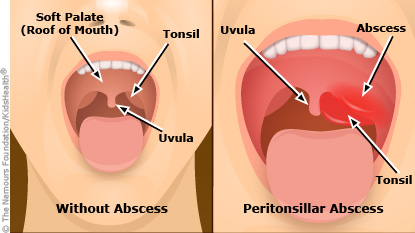A peritonsillar abscess is a collection of pus around one of the tonsils. It is caused by bacteria (a type of germ). Someone with a peritonsillar abscess has severe throat pain and may also have a fever, drooling, a muffled voice, trouble opening the mouth or swallowing, or even trouble breathing. With treatment, most peritonsillar abscesses heal completely.
Your child was treated with antibiotics through an intravenous line (IV). The abscess also may have been drained by a surgeon. Your child is feeling better and can go home.



Your child:
You know your child best. If they have symptoms that worry you, call your health care provider.

Your child has:

What causes a peritonsillar abscess? It starts with a throat infection, often caused by the same bacteria that cause strep throat. The bacteria spread to the area around the tonsil and form a pocket. Pus builds up in the pocket, making the abscess bigger.
How are peritonsillar abscesses treated? Health care providers treat peritonsillar abscesses with antibiotics. Sometimes a patient can take the antibiotics by mouth, but many will need to get them through an IV to make sure the medicine gets into the abscess. Most peritonsillar abscesses also need to be drained by a surgeon to get most of the pus out.
What problems can happen from a peritonsillar abscess? An abscess that's not treated can swell and block the throat, making it hard to swallow, speak, and sometimes even breathe. The infection can also spread into the jaw, neck, and chest and cause serious problems.